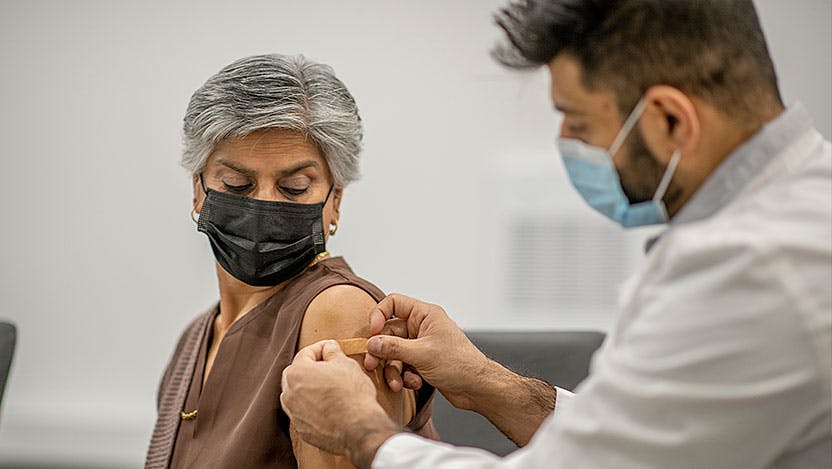What immunocompromised patients should know about the COVID-19 vaccines

Millions of Americans are at a higher risk of becoming seriously ill from COVID-19 because they’re immunocompromised. But for these vulnerable individuals who make up roughly 3% of the adult population, there’s good news: They can have the Pfizer-BioNTech and Moderna COVID-19 vaccines, according to the CDC.
“They’re both safe vaccines in persons with impaired immune systems,” said Kathleen Mullane, DO, PharmD, an infectious disease physician specializing in immunocompromised patients.
People who are very immunocompromised can’t have certain vaccines, such as the vaccine against measles, mumps and rubella, because the vaccine contains weakened live viruses that are too dangerous for damaged immune systems.
Because the Pfizer-BioNTech and Moderna vaccines contain only the genetic instructions for a single protein specific to the SARS-CoV-2 virus, it’s safe for this group to receive either vaccine. (Only patients with a history of severe allergy to the vaccines’ ingredients should not be vaccinated.)
“When it comes to these two vaccines, it’s not about toxicity but rather is the person going to get an immune response or not?” said Mullane, who had 126 patients participate in the third phase of the Moderna clinical trial.
No data exists on the vaccines’ effectiveness in immunocompromised patients because, as is true with the development of all vaccines, they weren’t included in the initial clinical trials. Those trials found the two vaccines had an efficacy rate of about 95% in preventing COVID-19, far higher than the rate seen after flu vaccination.
People can be immunocompromised for varying reasons. Autoimmune diseases such as rheumatoid arthritis and lupus cause the immune system to short circuit and attack healthy tissue instead of protecting a person from infections. Immunosuppression can also be caused by medications like corticosteroids and disease-modifying antirheumatic drugs (DMARDs), including some new biologics, which reduce inflammation, control pain and further impair function of the immune system.
Many medications used to fight autoimmune diseases, as well as cancer chemotherapies, suppress the immune system — as do certain radiation therapies and surgeries. Organ and bone marrow transplants, along with the anti-rejection medications that must be taken to ensure their success, are other causes of weakened immune systems.
Researchers don’t know whether these immunosuppressant treatments make the Pfizer and Moderna vaccines less effective – as some do in the case of flu vaccines – or if pausing or delaying treatment could make the vaccines work better. But it’s important that patients not change their treatment schedule without first speaking to their doctor.
“Many of these medications have a prolonged duration of action in the body, and delaying a dose may not have much effect on enhancing the immune response to a vaccine,” Mullane said. “In some cases, however, it is safe to hold the medication for a short period of time to allow a better response to a vaccine.”
Cancer patients, including those on long-term maintenance therapy, should also talk to their doctors about when to be vaccinated. There’s still no guidance and data on the best timing for vaccination, and every cancer patient’s immune system recovers differently.
As for transplant patients, they present a particular challenge when it comes to COVID-19 vaccination: The same white blood cells that protect our bodies against infections may attack a transplanted organ and cause rejection. Doctors prescribe very potent immunosuppressant medications, such as high doses of steroids (prednisone), thymoglobulin or rituximab in the immediate weeks after surgery, to reduce the chance of that happening. Depending on how immunosuppressed a solid organ transplant patient is, doctors may delay vaccinating the patient against COVID-19 for several weeks to months after surgery, while the patient transitions to the lowest dose of long-term maintenance immune-suppressing medications.
Mullane said it's possible to avoid this scenario if a patient can be vaccinated more than two weeks before their transplant surgery. (Patients on transplant waitlists rarely know when they'll receive an organ, so staying up to date with vaccines is important.)
Another question immunocompromised patients may have is whether they need to be vaccinated after recovering from COVID-19. The CDC recommends patients may be vaccinated shortly after having COVID-19, but wait 90 days if they were treated with COVID-19 monoclonal antibodies or convalescent plasma. Some doctors believe vaccinating soon after COVID-19 can act as a booster shot to improve the immune system’s future protection against a new COVID-19 infection.
“There’s disagreement over the best approach here because vaccinating shortly after an active COVID-19 infection could cause a severe inflammatory reaction,” Mullane said. “There’s also the argument that vaccines should be given first to people who have no protection, and to delay vaccinated people who have some protection after recovering from COVID-19 until vaccine supplies are secure.”
Even though immunocompromised patients have immune systems that respond less robustly to vaccinations, Mullane said the Pfizer and Moderna vaccines should provide some level of protection against COVID-19, which is better than no protection. How well the vaccines work will depend upon each patient’s overall state of immunosuppression at the time of receiving the two doses of vaccine.
Because of these complexities, Mullane says it’s essential that patients work closely with their doctor to determine when their immune systems will get the best response to a COVID-19 vaccine.
